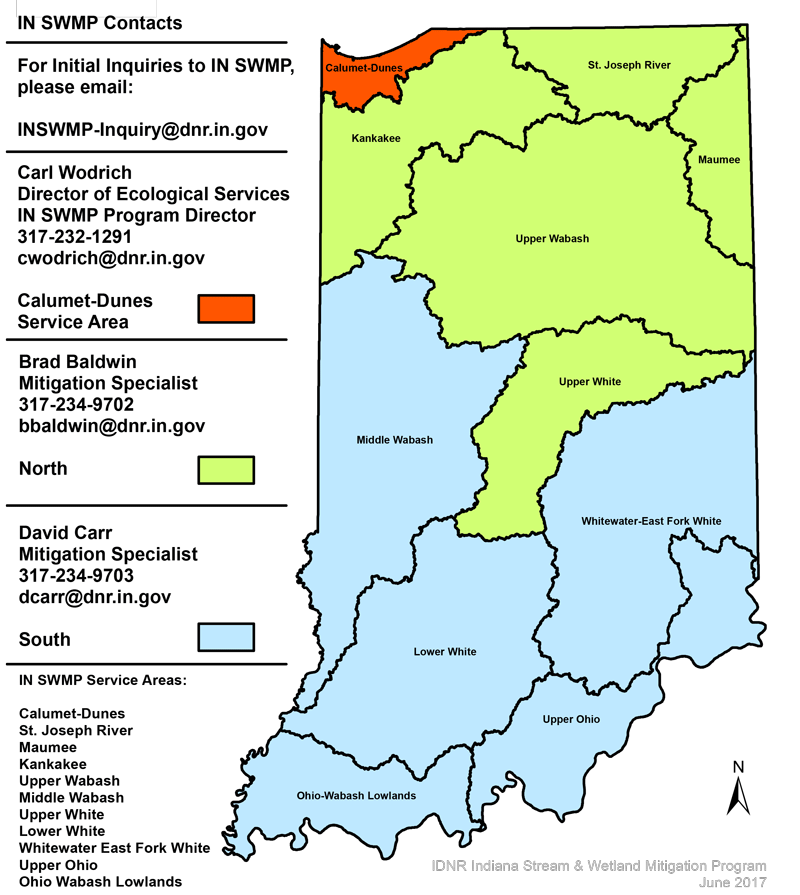ILF for property owners
The Indiana Stream and Wetland Mitigation Program (IN SWMP) seeks landowners interested in conservation efforts to protect and improve Indiana’s water resources. The program searches for willing property owners that have land containing streams and/or wetlands in need of restoration (or potential for restoration). It is our goal to restore aquatic resources by improving water quality and providing greater and/or enhanced fish and wildlife habitat. State-wide conservation initiatives are considered when prioritizing projects for IN SWMP to help fulfill program obligations.
Landowners interested in protecting their land (via conservation easement) or selling all or a portion of their land for a potential wetland and/or stream restoration mitigation project should email INSWMP-Inquiry@dnr.IN.gov or call an IN SWMP member.
In order to qualify, the potential property must typically meet the following criteria:
- The property must have a minimum length of 1,500 linear feet of restorable stream, with property ownership or adjacent property owner participation along both sides of the stream and/or a minimum of 20 acres of restorable wetlands.
- Any potentially restorable stream reach should exhibit signs of instability and erosion, and have trees missing from the streambanks. An example of a targeted stream restoration project is one that might have been historically straightened, channelized, relocated, piped, etc.
- Potential wetland restoration projects should ideally be on land that has been in the past converted wetlands and/or degraded wetlands. Typical wetland restoration sites can be marginal farmland that is too wet to farm due to prolonged inundation and flooding and has poorly drained (hydric) soils.
- Interested landowners should possess subsurface/mineral rights (e.g., coal) and any oil and gas leases. Additionally, it would be ideal for landowners to also have knowledge of other easements that may be adjacent to or within/across the property, such as regulated drains, transmission/pipeline easements, etc.
Each property and project is unique. Questions about the typical criteria for restoration projects can be emailed to INSWMP-Inquiry@dnr.IN.gov or you can refer to the IN SWMP Map or the best contact in your area.
Property owner requirements
In addition to property requirements, the owner must meet the typical requirements before IN SWMP would pursue a project. This helps ensure the efficient design, construction and delivery of restoration projects. Requirements include:
- Property owner willingness to sell or donate land that the DNR IN SWMP can restore. DNR will only move forward with a project with property owner agreement. The DNR does not use eminent domain nor does it condemn land for restoration projects.
- All restoration projects must be permanently protected for the entire footprint of an IN SWMP project as does additional acreage that may be necessary to provide a buffer to the project area.
Project selection
All potential restoration projects will be screened and ranked by program staff based upon factors such as feasibility, potential costs, and compatibility with addressing the parameters outlined in the Compensation Planning Framework.
After a project has passed the initial screening process by DNR staff and/or contractors, the DNR will propose the details of the project to the U.S. Army Corps of Engineers (USACE) and Interagency Review Team (IRT) in a conceptual plan. The USACE has the approval authority on whether the restoration project may move forward into mitigation planning and design.
Next, the DNR will work with a team of design engineers, contractors, potential conservation partners and the property owner to design the site for full approval to move into construction, monitoring and maintenance until the project is released from regulatory authority and can move into long-term monitoring and maintenance.
If you have any questions about eligibility of your property or the program, please contact the DNR’s IN SWMP staff.
Program contacts
- Carl J. Wodrich, Director of Ecological Services, 317-232-1291
- Brad Baldwin, Mitigation Specialist, 317-234-9702
- David Carr, Mitigation Specialist, 317-234-9703

